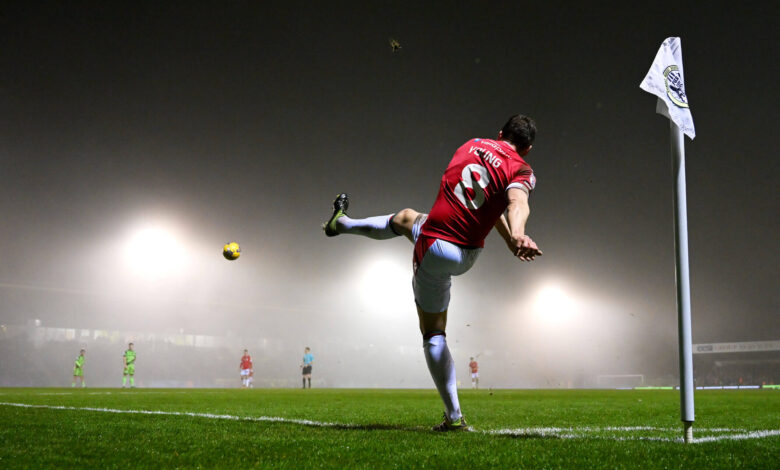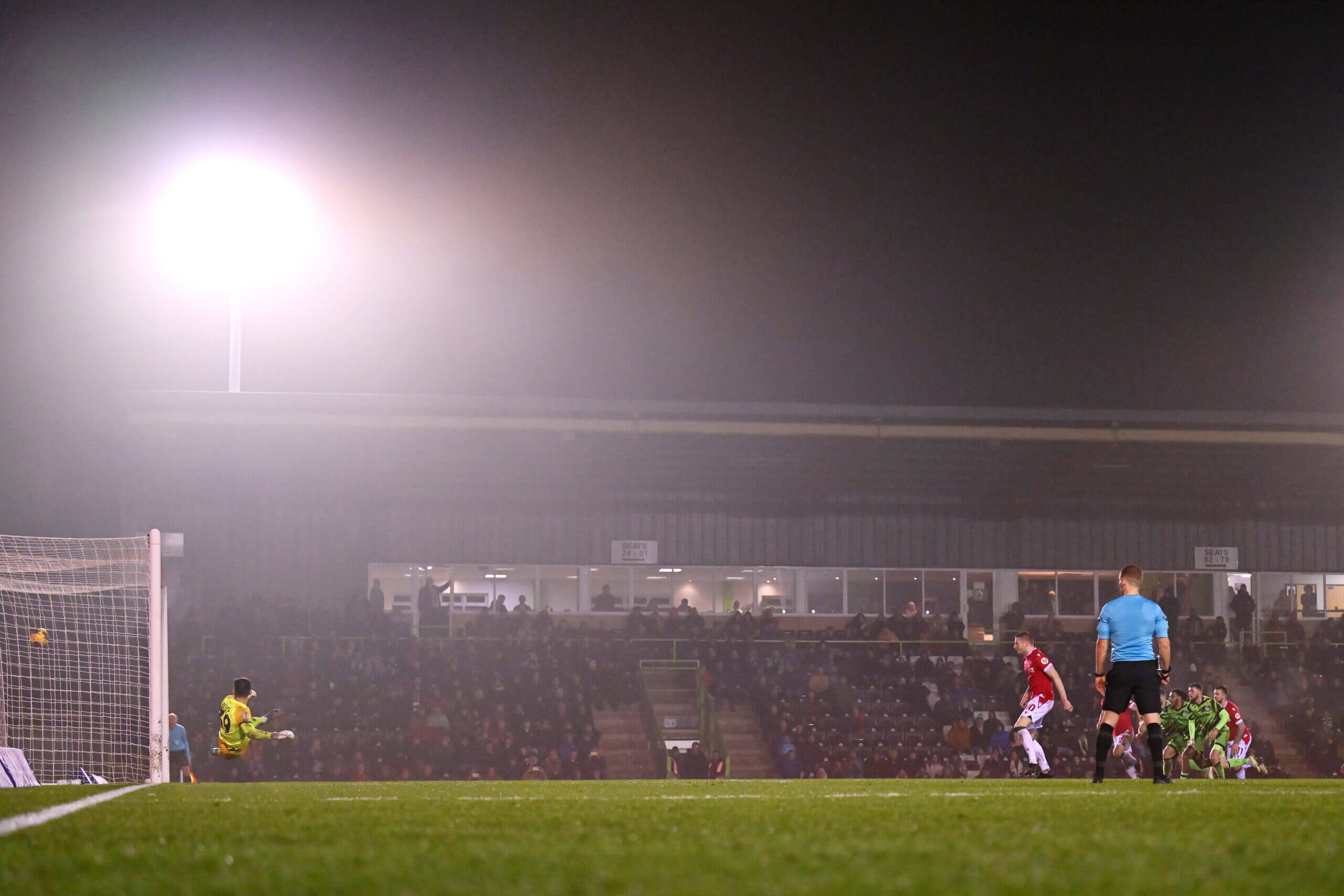Planes, strains and automobiles: How Wrexham dealt with 1,500 miles of travel in 15 days

Fifteen hundred miles in 15 days might not exactly put Wrexham on par with Phileas Fogg.
Nevertheless, as the League Two club has discovered the hard way, such a schedule is not without its challenges.
For supporters, it’s time off work and the financial cost of making long-distance trips to Sutton United, Milton Keynes Dons, Gillingham and Forest Green Rovers in a little over a fortnight.
With three of those fixtures falling in midweek to further test the fans’ devotion, Fogg, the fictional character from Jules Verne’s novel Around The World in Eighty Days, may well have doffed his cap at the stoicism of those present on a misty evening in Gloucestershire as Paul Mullin’s stoppage-time penalty rescued a dramatic point.
In terms of logistics, the players have had it much easier. Wrexham could fly their squad to three of those recent away games thanks to the huge income streams that this season are expected to top £20million ($25m).
Even allowing for the benefits of avoiding hours and hours of bum-numbing coach travel, however, such a schedule is bound to take a toll on even the fittest of athletes.
“It is tough on the body but that is what we are paid to do,” says wing-back Ryan Barnett. “The gaffer has also used the squad well over the month.
“With such a tight turnaround, it has been tough, but we have great recovery processes at the club and everyone looks after themselves.”
Wrexham’s medical staff are well-versed in dealing with the fallout from excess travel, especially after last summer’s tour of the United States when a sleep expert was drafted in to try to reduce the effects of jet lag.
Nutrition, hydration and recovery were the key aspects back then of a plan overseen by Kevin Mulholland, the club’s highly regarded head of performance, medicine and sports science. That has continued into the season, reaching a peak during the recent flurry of long trips that began with the February 13 victory at Sutton United.
Having flown south on the morning of the game from Manchester Airport and then bussed to a suburban London hotel for a couple of hours’ sleep, the players then made the return journey by plane at midnight. Wrexham also took to the air for the trips to Milton Keynes and Gillingham.
Had there been a suitable airport close to Forest Green’s New Lawn home, then the squad would have done the same this week. Instead, with Oxford being the nearest at an hour away, the decision was taken to make the 290-mile return journey by road, setting off on Monday lunchtime and returning straight after the game.
That brought its own challenge, namely how to find the time for the players to undergo their latest round of cryotherapy, where the body is given a big physiological shock via exposure to temperatures as low as minus 120C (-184F).
The benefits include re-energising aching limbs to boost player recovery and help with sleep patterns. Wrexham turned to cryotherapy for the first time a year ago, during an equally packed February, and the players were keen to take up another session following the quick turnaround from the weekend loss to Gillingham.
A solution was found on Monday night: the mobile chamber was parked up outside the players’ hotel in Gloucestershire, where they underwent the short, sharp blast of freezing temperatures before retiring to their beds.
Wrexham may have found it hard to break down a resolute Forest Green side 24 or so hours later, the hosts effectively retreating to their 18-yard line after going ahead inside three minutes through Emmanuel Osadebe’s curled finish.
But Wrexham kept going to the very end, which is how Mullin came to find the energy to win the penalty he converted at the death.

Paul Mullin rescues a point at Forest Green (Dan Mullan/Getty Images)
Once the final whistle had blown, the focus quickly switched to Saturday’s home game against Accrington Stanley. This is where the nutrition, hydration and recovery mantra returned to the fore, with the four medical staff who make the trip to every away game ensuring the players consumed lots of protein within an hour of the final whistle.
Chicken and fish were the order of the day as the coach started the journey north. Further small-portion meals followed throughout the journey; the consensus being that the players should eat frequently but sparingly to get the required building blocks to aid muscle recovery.
Getting fluids back on board is also seen as paramount. Specially prepared drinks are handed out to combat the loss of sweat and salt. This is regardless of whether the squad is travelling by air or coach, with the usual additional threat of dehydration associated with flying not so much of a problem on these return trips due to the journey times being short — around 45 minutes — and the plane rarely travelling higher than an altitude of 20,000 feet (most commercial airliners reach between 30,000 and 40,000 feet).
Once back at the training ground, the players undergo a simple urine test that has made life a lot simpler this season. Before, they had to pee into a pot that was then tested by staff, but now, the players simply use a specially fitted toilet contraption that will flash red, amber or green depending on the level of hydration.
In terms of getting players in the best shape for the next game, this has been a game-changer. The entire squad are now tested in five minutes. This, together with the players being weighed straight after a match and then again at training, means there is effectively an early warning system at a time of the season when players can be more susceptible to injury due to the cumulative workload.
Thankfully for Wrexham, their schedule becomes much kinder from here on in. Seven of their remaining 12 fixtures are at home — only the April 6 trip to Colchester United can be classed as long-distance.
This will mean more time on the training pitch, something that just hasn’t been possible recently due to Wednesday being the players’ day off and Thursday being all about recovery, often involving the swimming pool.
Only on Fridays does the focus turn fully to the weekend fixture. For a team that has not been firing on all cylinders lately, this has been far from ideal.
“This month has been tough,” says manager Phil Parkinson. “We’ve had a lot of travelling. With all the fixtures, I looked at it and thought, ‘Can we get through February still in contention?’. We have and now we can regroup, as a squad, knowing the fixtures are a lot kinder going forward.”
(Top photo: Dan Mullan/Getty Images)



